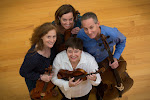As musicians, we often spend 95% of our effort on how we sound. But for the average audience member, a concert consists of both a visual and an audio experience. When this involves a small ensemble looking coordinated is also a challenge.
What you wear says a lot about you. To some people, wearing jeans and a T-shirt to a performance says you do not care about the concert. But to other people it might be a “hip” statement. Pianist Awadagin Pratt often soloed with major symphonies in jeans and a T-shirt (however, he did not do this until after he won the Naumburg Competition). The Kronos Quartet also wears “non-traditional” clothes such as leather jackets and jeans. In the case of Awadagin, his fame at winning a major competition took some (but not all) of the edge off of the criticism of his dress code, and gave him a persona of an “edgy” performer. In the case of the Kronos Quartet, their dress really reflects their choice of programming, which is mainly contemporary music.
Whatever you or your group decides to wear, there are two important things to remember: 1) It needs to look like you care and 2) It needs to be true to the individual and/or the group. I personally despise performing in a tuxedo or even a suit. For me, it adds a barrier between me and the audience that I strive to remove. However, there have been times that I do perform in a suit with my quartet, because as groups there are times we want to portray a very conservative look. At other times we might perform in jeans, because the venue is different and we want to portray a different feeling. But whatever I wear, if I think I look good I will go into a concert with more confidence and security then if I am embarrassed by my dress.
-Tim Schwarz
